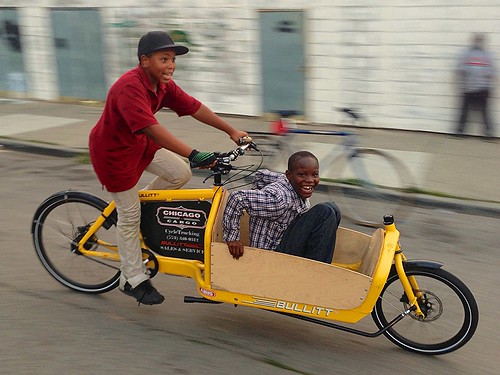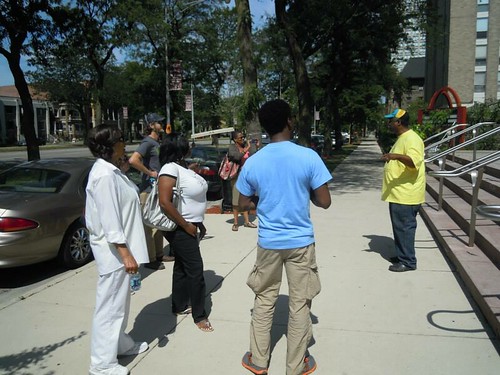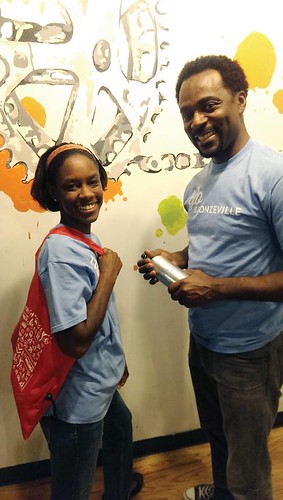[This piece also runs in Checkerboard City, John's column in Newcity magazine, which hits the streets on Wednesday evenings.]
In the early twentieth century, Chicago’s Bronzeville community, aka the Black Metropolis, was home to African-American innovators and barrier breakers in business, music, art, literature and other fields. Now the neighborhood is ground zero for another first, the Go Bronzeville transportation demand management program. This campaign, launched in September by the Chicago Department of Transportation, offers free resources, events and support for residents who want to make more trips via walking, biking, transit and car-sharing, instead of driving alone.
TDM programs in other U.S. cities have helped lower the number of single-occupancy car trips, saving participants time and money while improving their health, as well as fighting traffic jams and lowering emissions. CDOT is using federal Congestion Mitigation and Air Quality Improvement funds to conduct campaigns in five different Chicago communities.
Bronzeville is a perfect storm for the first pilot, since it’s a low-income community of color with a progressive streak, which recently gained better train service via the South Red Line rehab, as well as protected bike lanes on 31st Street and State Street, and fifteen Divvy bike-share stations. The next neighborhood to get a TDM program will likely be a transit- and bike-friendly Latino community like Little Village, according to CDOT Deputy Commissioner Sean Wiedel.
As part of Go Bronzeville, CDOT contacted 7,500 residents, asking them to fill out a survey about their current commuting habits and which new travel modes they’d like to explore, and offering to send them “Go Kits.” These are red, reusable shopping bags emblazoned with cute transportation icons and filled with brochures, maps and other resources for getting around the city efficiently, tailored to the recipient’s interests, as well as incentives like free Divvy passes.
Outreach ambassadors LaKeisha Hamilton and Ronnie Harris have been giving presentations to churches, block clubs, senior centers and other community organizations, as well as organizing walking and biking events that encourage residents to get more active. The former have included tours of local historic landmarks and public art, as well as GirlTrek walks, part of a national program to promote fitness hiking among African-American women and girls.
Many of the bike events are collaborations with the cycling group Bronzeville Bikes, based out of the Bronzeville Community Garden at 51st Street and Calumet Avenue. These have included free bike repair sessions at the garden, two-wheeled tours of local sustainability initiatives, and a “Divvy and Dogs” ride, which encouraged folks to give bike-sharing a spin by pedaling to a local red hot stand.
“When it comes to walking and biking, a lot of people need to be pushed, because sometimes they’ll say, ‘Oh I can’t do it,’” Hamilton says. “So we became coaches and mentors, saying, ‘Yes you can, let’s try this out.’” Obesity, heart disease and diabetes rates are especially high among African Americans, she noted. “We let people know that if you exercise more, if you get out and walk or bike instead of starting up the engine of your car, maybe we can bring those numbers down,” she says. “They’re like, ‘Yeah, I didn’t see it that way.’”
Harris, a third-generation Bronzeville native, says that discovering a new travel method can be a path to opportunity for disadvantaged youths. “There are so many young, black men here in the community that are quite isolated, as a result of their own actions to a certain extent, but then other times it’s injustice in the system somewhere,” he says. “But after I made them aware of alternative modes of transportation, I would oftentimes see the light bulb go off that you don’t need to drive a car with a suspended license anymore. And if you don’t have money to get on the public transportation system, there’s nothing wrong with you riding your bike to an interview.”
One of Go Bronzeville’s most popular events this fall was a block party at the garden organized with Chicago Cargo Bike Roll Call, which drew seventy-five people. “We blocked off Calumet, and the guys had all their cargo bikes there for people to try out,” says Maggie Melin, an Active Transportation Alliance staffer who’s coordinating the TDM project on the local level. Portland-based Alta Planning + Design helped create the program for CDOT. “People were just going up and down the street, especially the kids, they were jumping in the cargo containers and riding around.” In addition to repairs, residents were offered free installation of rear racks, transforming their cycles into bonafide cargo bikes.
Hamilton says that part of the reason Go Bronzeville has been successful is that residents can relate to her and Harris as fellow community members. “Ronnie helped the young black men in that area because he made bike riding look cool,” she says. “He brought sexy back to biking. The young people call it swag. We both made it real and tangible for the Bronzeville young people. They were like, ‘Wait a minute, she looks like me, and she looks cool riding her bike.’”






